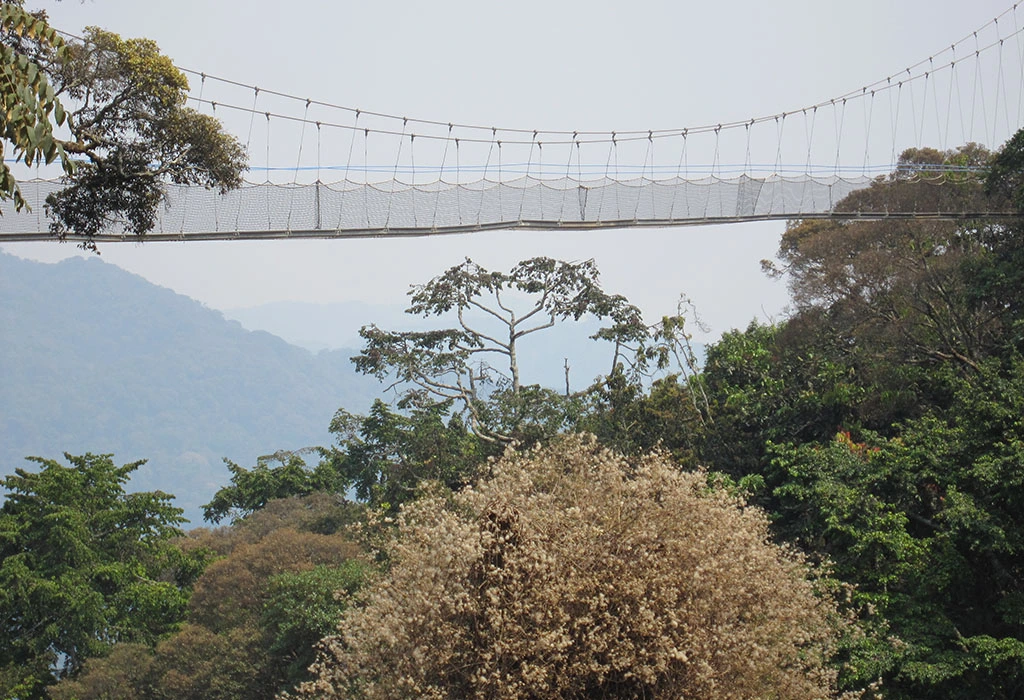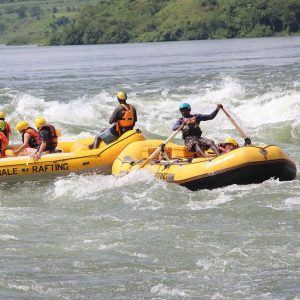Nyungwe Chimpanzee trekking
In Rwanda, chimpanzee trekking is conducted in the Nyungwe forest. This extensive area of montane rainforest, currently the largest in Africa, is a popular conservation destination for scientists and researchers interested in primate study. The Cyamudongo forest is currently a part of the larger Nyungwe National Park. A vital water catchment area in the nation, Nyungwe Forest generates rainfall that supplies rivers like the Nile in Uganda and others in Congo. With more than 310 bird species, Nyungwe Forest is an excellent bird refuge. Among many other species, birdwatchers can see Ruwenzori turacos, purple-breasted sunbirds, Rockefellers’ sunbirds, red-collared mountain babblers, paradise flycatchers, and Chapin’s flycatcher. Nyungwe Chimpanzee trekking.
In Nyungwe Forest, chimpanzees hiking
Man’s closest cousins are chimpanzees. In addition to having many of our characteristics, they are maybe the most intelligent apes after humans. They can survive in captivity for up to 60 years. Three primary locations in Rwanda are home to chimps: Gishwati Mukura National Park, Nyungwe National Park [including the Nyungwe and Cyamudongo forests], and Nyungwe National Park. The largest concentration of chimps [more than 400 individuals]and other primates [13 species] may be found in Nyungwe National Park. In Nyungwe National Park, two communities of chimpanzees have become largely habituated. The majority of them [60 individuals] reside in Nyungwe Forest, with the remaining 30 individuals discovered in Cyamudongo Forest. The Dent’s monkey, black-faced ververt monkeys, L’Hoest monkeys, baboons, grey-cheeked Mangabeys, Rwenzori colobus, black and white colobus monkeys, blue monkeys, Mona monkeys, silver monkeys, owl-faced monkeys, and baboons are among the other species.
Tracking Chimpanzees in Nyungwe Forest, in many respects, chimpanzee trekking differs from gorilla trekking. Chimpanzees are noisy, obstinate, and highly mobile. Unlike mountain gorillas, they spend a lot of time on top of the trees because they are lighter. Mountain gorillas are incredibly calm and friendly. They will eat in silence and engage in group interactions with less drama and agitation. Chimpanzees wander quickly on the ground and atop trees before settling down, thus tracking them demands being physically fit enough to follow the primates for extended periods of time.
How much time can it take to trek chimpanzees?
In the Nyungwe forest, tracking chimpanzees can take two to six hours or more. The chimps may calm down and let you snap pictures or examine them more closely after you have been pursuing or following them for some time. You will observe that the chimps behave exactly like people do. They will groom one another, mate, play, nurse, and get into fights. While some group members are more talkative, others are more reserved. They have internal politics and group dynamics just like people. Chimpanzees are interested in people, yet they will usually avoid close contact.
What is the cost of chimpanzee trekking in Ngungwe National Park?
In Nyungwe National Park, Rwanda, chimpanzee trekking permits now cost $250 per person per expedition for non-resident foreigners. Residents of East Africa pay $25, whereas foreigners pay $75. There is a park entrance fee in addition to the permit, which is $10 for East African citizens, $60 for international residents, and $100 for foreign non-residents.
Best time to track chimps in Nyungwe National Park
In the Nyungwe forest, chimpanzee trekking is scheduled all year round. However, the rainy/wet season is the ideal time of year to trek chimpanzees in Nyungwe National Park. The abundance of food in the forest during this period restricts the chimps’ range of motion. It is more challenging to follow chimps during the dry season because they venture far into the expansive forest in pursuit of fruits. For those interested in nature walks and the canopy, the dry season is the best time to visit.
Activities in Nyungwe besides trekking chimpanzees
In Nyungwe National Park, tourists can engage in chimpanzee tracking, bird viewing, canopy walks, nature walks, tracking smaller primates, and visiting one of the waterfalls, even though chimpanzee tracking is the most popular activity in the park. The chimpanzee habituation experience might now be accessible in Rwanda as well.
Finding additional primates
In Africa, Nyungwe National Park is among the greatest locations to see primates. With thirteen species, it is comparable to Uganda’s Kibale National Park. After chimpanzees, the Rwenzori and Angola Colobus are the most preferred species. In Angola, the Angola Colobus Monkey is no longer found. In the park, 400 Angola Colobus are semi-habituated. There are other golden monkeys in the area, but they are not accustomed to it.
Canopy Walks
Using the Canopy Chimpanzee Trekking in Nyungwe National Park. Is the greatest way to explore this dense and ancient forest. As I write this, it’s the only one in East Africa. The sturdy steel bridge, which is 60 meters high, is situated atop the trees to provide visitors with an aerial perspective of the forests, birds, and primates. The walkway has platforms and observation spots where visitors may stop and take in the breathtaking views and fauna.
Observing birds
One of Rwanda’s top locations for birdwatching is Nyungwe National Park. About 26 of the more than 300 bird species found in Nyungwe Forest are indigenous to the Albertine Rift.
Hikes and nature walks
Nyungwe National Park offers a variety of forest hiking trails. One would have to walk roughly 130 kilometers if they were to finish all the trails.
Cultural and Social Visit
While on a tour of the Nyungwe forest, there are numerous opportunities to explore the distinctive culture of the Rwandan people. Visiting locations such as the Banda Community Village or the Kitabi Cultural Village is the ideal way to get started. Additionally, you can see performances by Nyungwe’s buddies or the Cyamudongo cultural ensemble. Through storytelling, theater, and dance, these ensembles all highlight Rwanda’s rich cultural heritage. Opportunities to purchase souvenirs (local artwork and crafts) are constantly available.




